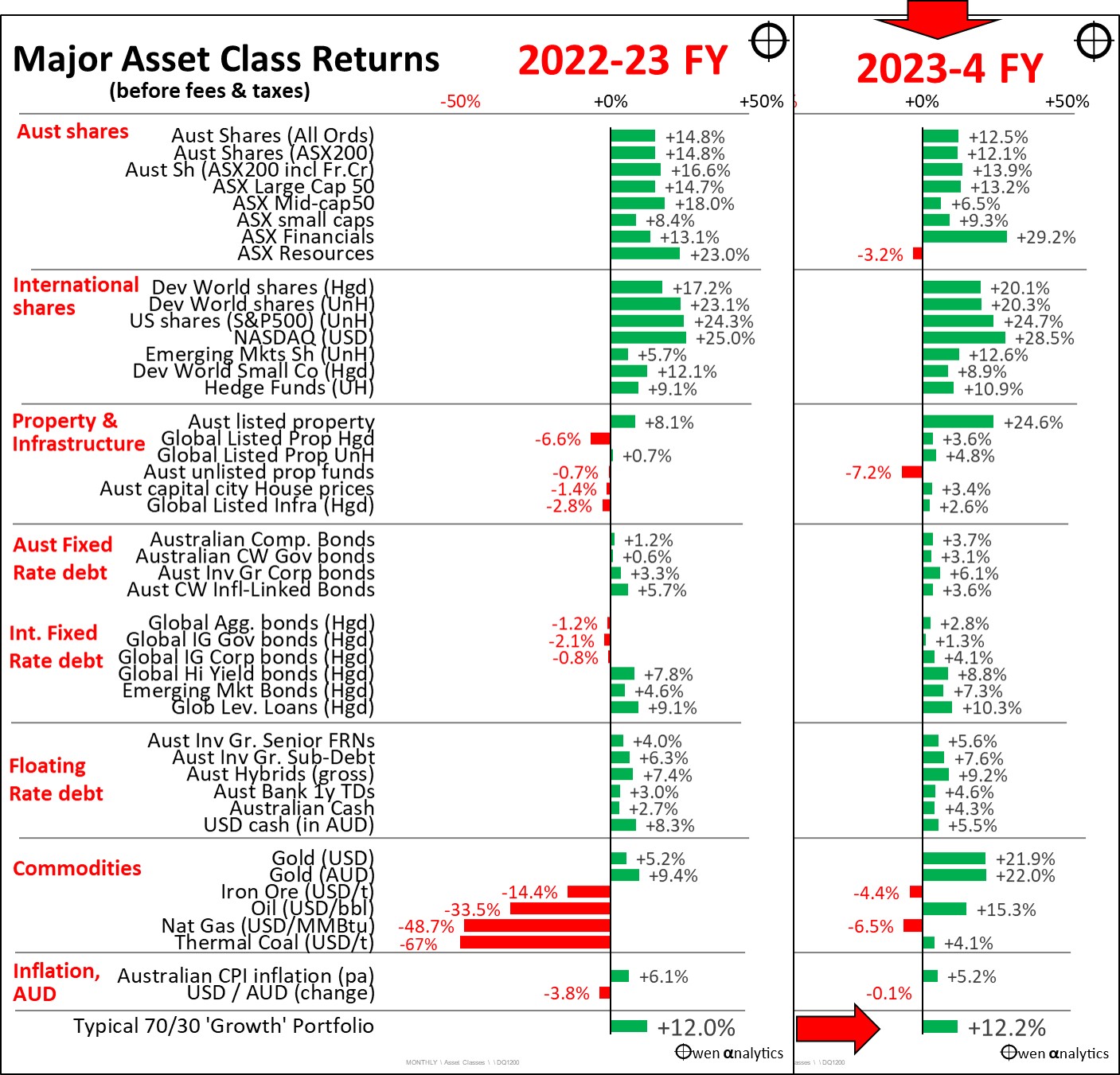Congrats on another good financial year for lazy long-term investors!
Today’s pair of charts show returns from the main asset classes and sectors for Aussie investors for the past two June financial/tax years, plus other key data including inflation, exchange rates, commodities prices, and house prices.
The standard 70/30 ‘growth’ fund.
A standard diversified passive ‘growth’ fund (70/30 shares/bonds) would return around 11% after fees for Aussie investors for the 12 months to June 2024.
The bottom line on the charts shows returns of 12% before fees on a typical 70/30 mix(*).
This is almost exactly the same return as last financial year (2022-3). A lot has changed in the world over the course of the past two years, but returns were virtually the same.
Even after inflation of say 4%, a lazy return of 11% is still a very healthy 7% ‘real’ (after inflation) return for the year.

Lazy?
I say ‘lazy’ because any ‘passive’ investor would have achieved these returns without trying to chase hot stocks or funds or ‘themes’ or fads, or fiddle with opaque ‘alternatives’, or whacky ‘new’ asset classes, or listened to perennial doomsayers prattling on about recessions or political crises or world wars or [insert latest scare here].
The big end of town
I use a standard 70/30 ‘growth’ mix for this story as that is what most large superannuation funds use as their ‘default’ option.
Unfortunately, most large ‘professionally run’ super funds will report lower returns on their ‘default’/‘growth’ funds again this year because they are stacked with unlisted real estate and ‘infrastructure’ assets that have suffered big losses in recent years – and they are probably still covering up even more hidden losses by using fudged valuations.
The other main reason for lower performance of the big funds is that they have floors full of expensive fund managers and analysts, and they like to fiddle a lot (to look busy).
For the 2022-3 financial year, returns on large super fund ‘growth’ options averaged around 9% after fees, but simple off-the-shelf diversified index funds with the same 70/30 asset mix returned 11% after fees. I expect this to continue for the 2023-4 year as well.
What is '70/30'?
(*) There are variations in what is actually in the 70/30 or ‘growth’ portfolios offered by the major passive/ETF providers, but most are very similar.
The 70% in ‘growth’ assets is a mix of Australian and global shares, with the global shares side usually 50% hedged.
The 30% in ‘defensive’ assets is a mix of Australian fixed rate investment grade government/semi/corporate bonds, and global fixed rate investment grade government/semi/corporate bonds, fully hedged.
Can’t always be lazy
Being lazy (ie not fiddling or being swayed by chattering ‘experts’ or shrill media) works most of the time, but not always, unfortunately. Some tweaking does make sense from time to time as conditions change (for example, I have avoided fixed rate bonds in recent years).
About once or twice per decade there is a major market rupture that requires some serious thinking and major changes.
In the coming days I will post my usual wrap-up for the latest month and financial year. In the meantime, we can take some time to see how our own portfolios fared.
‘Till next time – happy investing!
Thank you for your time – please send me feedback and/or ideas for future editions!